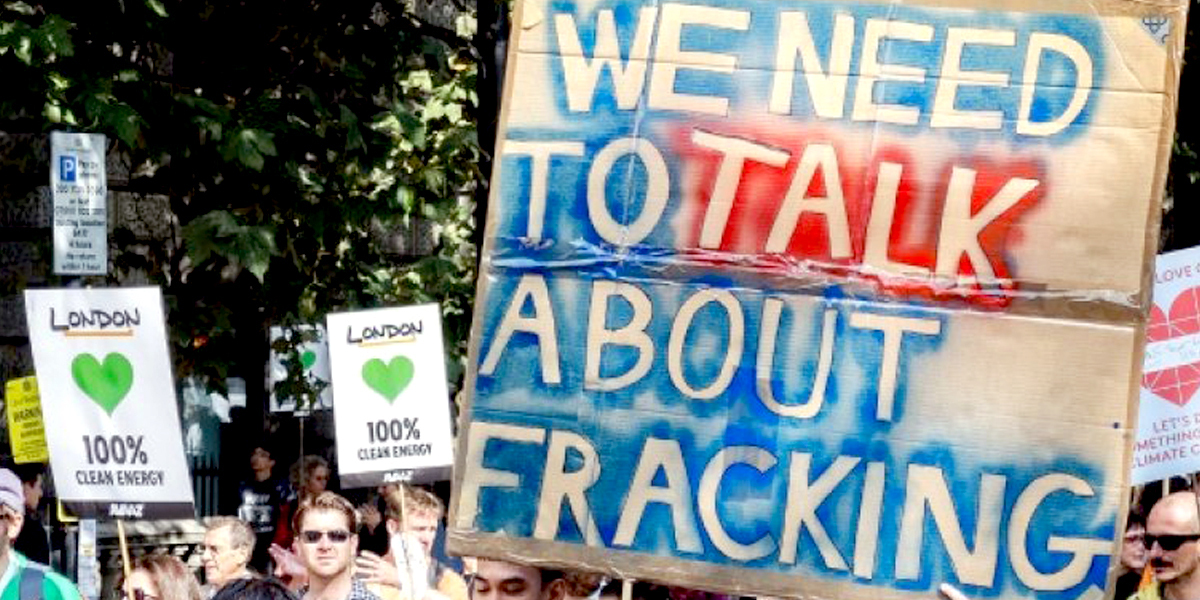

By Paul Brown
Public opposition to pumping water and chemicals into the ground to extract gas from shale—the technique known as fracking—is growing even in the countries whose governments are most in favor.

Although only four countries—France, Bulgaria, Germany and Scotland—have an outright fracking ban at the moment, many districts in countries that allow fracking in some areas ban it in others.
This is true in the U.S. and in Canada, where potential wells will not be developed because local authorities have refused permission.
The carrot for governments generally has been the promise from the fossil fuel companies of large quantities of cheaply-extracted gas that will last for decades and cut their reliance on imports.
Fracking Boom
This has certainly been true in the U.S. and Canada, where a large-scale fracking boom has altered the balance of world energy resources and cut the price of gas so much that both coal and nuclear have struggled to remain competitive in electricity production.
In theory, China has even larger reserves of shale gas and is anxious to phase out coal plants, actively exploring a cleaner home-grown gas industry of its own.
But allegations that fracking contaminates water supplies and creates small earthquakes have led to a backlash in local communities across the world.
In Algeria, for example, where water is extremely precious, it led to large-scale protests. And in Europe, a much more crowded continent where homes and villages are always close to the proposed drilling sites, there has been a lot of local opposition.
The issue has also become much more controversial because of the increasing awareness of climate change.
Exploiting new fossil fuel reserves is seen as being against the spirit of last year’s Paris Agreement on climate change, when all the governments of the world signed up to prevent dangerous global warming.
Methane emissions rising from fracking, new study shows https://t.co/xWU3gGYBaR via @EcoWatch pic.twitter.com/hOBh4R7MNs
— Climate Nexus (@ClimateNexus) September 14, 2016
Starting a new fracking industry seems incompatible with the declared aim of governments in keeping global temperature rise below 2°C.
The UK government, while signing up to the Paris Agreement, is enthusiastically backing fracking to provide a home-grown source of gas for 50 years, and has overturned local authority objections to allow exploratory wells to be drilled in Lancashire, northwest England.
However, the ban remains in place in Scotland because of public opposition and a large renewables industry.
But it seems unlikely that fracking will have an easy ride even in England. A report by the University of Nottingham on public attitudes to the new industry has shown that support has sunk to an all-time low in the UK.
It has dropped from 58 percent in favor in July 2013 to just more than 37 percent in October 2016—the first time that a majority of people has been against fracking. The surveys have been running annually since 2012.
The reasons for opposition are all environmental, because of local effects and also the unacceptability of more fossil fuels as an energy source.
While local environment concerns dominated early opposition, the wider implications of climate change and the issue of exploiting new fossil fuel reserves is becoming more important.
Downturn in Support
The survey asks whether shale gas should be part of the UK energy mix. Since this question was first posed in July 2013, shale gas continues to lag behind in popularity, compared with other energy sources. And according to this latest survey, it remains the energy source the public are least likely to want in the UK’s 2025 energy mix.
Professor Sarah O’Hara, of the School of Geography at Nottingham and co-director of the survey, said:
“The sharp downturn in support for the extraction and use of shale gas in the UK over the last 12 months is hugely significant, as is the fact that for the first time since we began running the survey in March 2012 more people are against shale gas extraction than in favor.
“It is clear that people are not only concerned about possible impact on their immediate environment, something that dominated early debates around shale gas, but importantly are beginning to think more broadly about the implications for greenhouse gas emissions and future climate change.”
Mathew Humphrey, professor of political theory at Nottingham’s School of Politics and International Relations and survey co-director, said: “The results of the survey show that the government will increasingly have its work cut out selling fracking to the UK public.”
Mark Ruffalo: President Obama, You Still Have Time to Ban Fracking https://t.co/TIjRoF0TPe @greenwatchdogNY @FrackAction
— EcoWatch (@EcoWatch) October 13, 2016

 233k
233k  41k
41k  Subscribe
Subscribe 